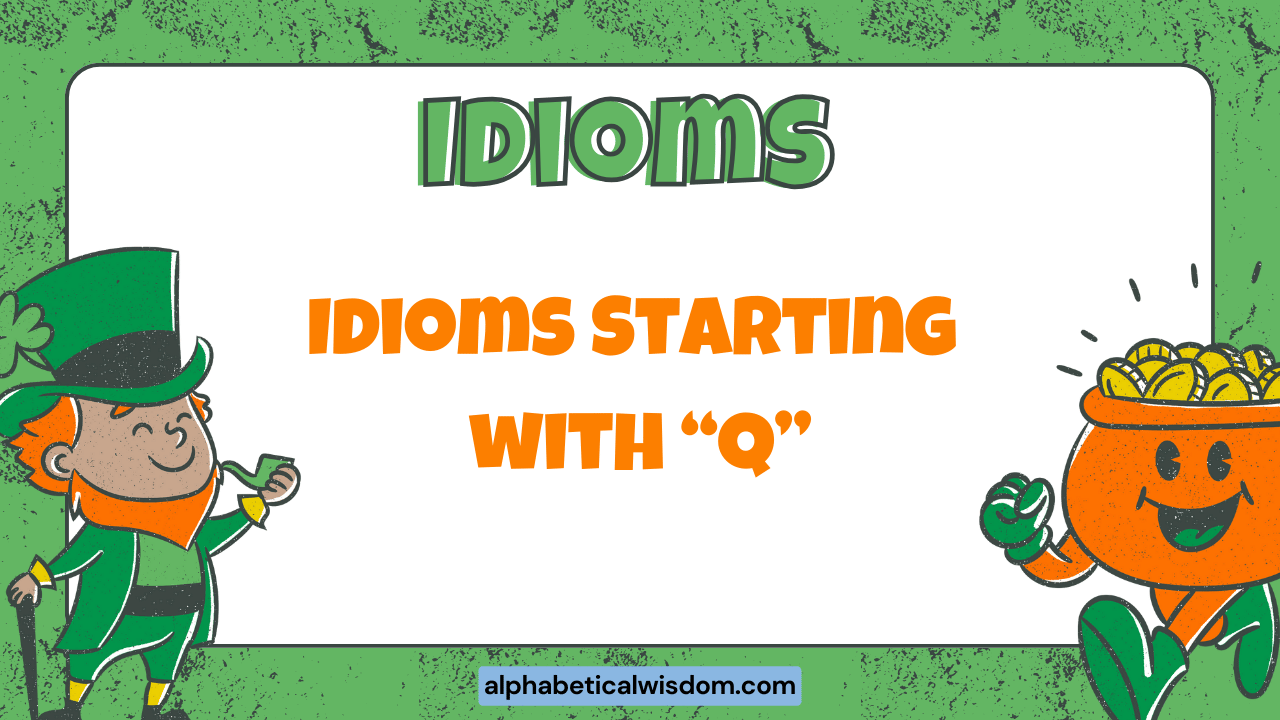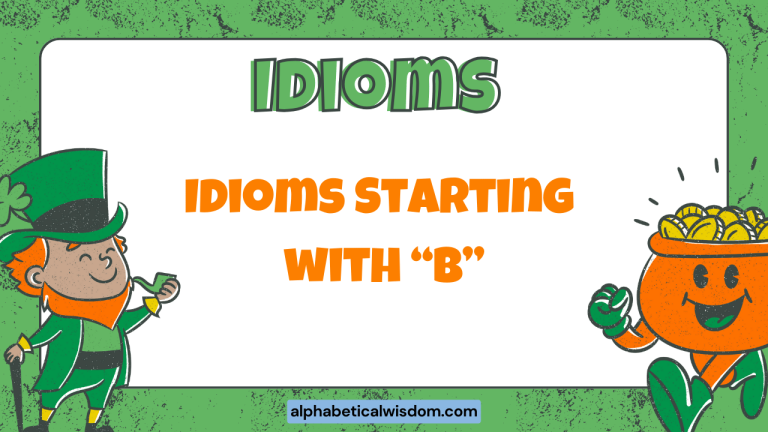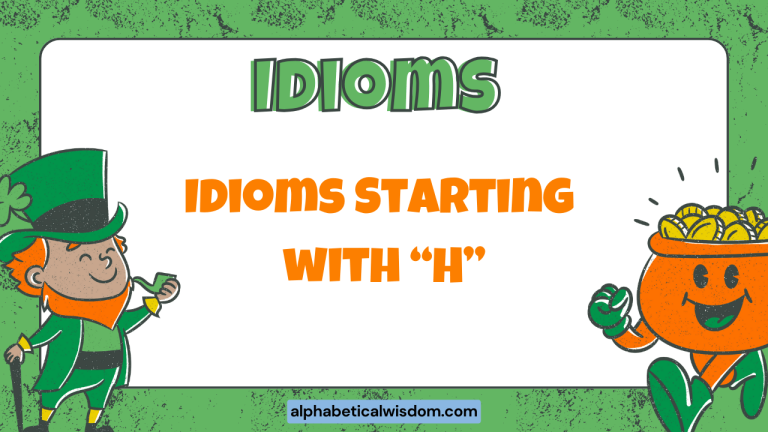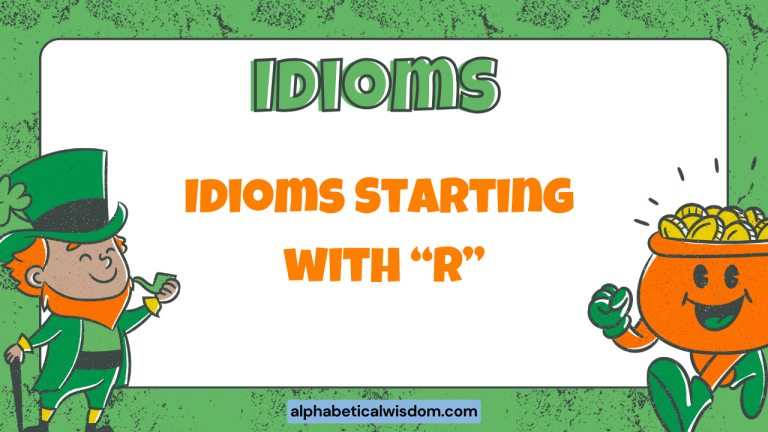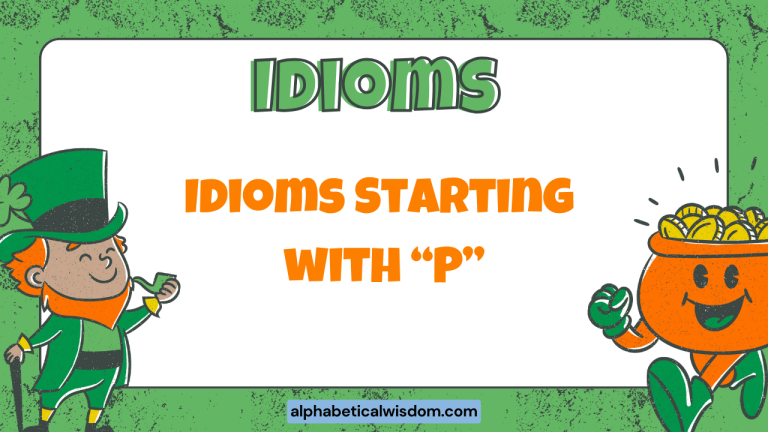Idioms Starting with Q: A Comprehensive Guide
Idioms are an integral part of the English language, adding color, depth, and nuance to our communication. Mastering idioms, especially those starting with less common letters like ‘Q’, significantly enhances one’s fluency and understanding of native English speakers.
This article provides a comprehensive exploration of idioms beginning with the letter ‘Q’, offering definitions, examples, usage rules, and practice exercises. This guide is perfect for ESL learners, students preparing for English proficiency exams, and anyone looking to enrich their vocabulary and command of the English language.
Table of Contents
- Introduction
- Definition of Idioms
- Structural Breakdown of Idioms
- Types and Categories of Idioms
- Examples of Idioms Starting with ‘Q’
- Usage Rules for Idioms
- Common Mistakes with Idioms
- Practice Exercises
- Advanced Topics in Idioms
- Frequently Asked Questions
- Conclusion
Definition of Idioms
An idiom is a phrase or expression whose meaning cannot be understood from the literal meanings of its individual words. Instead, it has a figurative meaning known through common usage. Idioms often reflect cultural nuances and historical contexts, making them a fascinating aspect of language learning. They are classified based on their grammatical structure and function within a sentence. Understanding idioms is crucial for both comprehension and effective communication in English.
The function of an idiom can vary. Some idioms act as nouns (e.g., “a hot potato”), while others function as verbs (e.g., “to kick the bucket”) or adverbs (e.g., “in a nutshell”).
The context in which an idiom is used is critical to understanding its intended meaning. Without this context, misinterpretations are highly likely.
Structural Breakdown of Idioms
The structure of an idiom can be quite diverse. Some idioms are simple phrases, while others are more complex clauses.
Many idioms contain verbs, nouns, prepositions, and adjectives. The arrangement of these elements contributes to the idiom’s unique meaning.
It’s important to recognize that altering the structure of an idiom, even slightly, can destroy its idiomatic sense.
Consider the idiom “to be on the fence.” This idiom includes the verb “to be,” the preposition “on,” and the noun “fence.” Any alteration, such as “to be near the fence,” changes the meaning entirely. The specific combination of these words in this order creates the idiomatic expression.
Types and Categories of Idioms
Idioms can be categorized in several ways, including by their function, thematic content, or grammatical structure. Here are a few common categories:
Functional Categories
- Verb Idioms: These idioms contain a verb and often describe an action or state (e.g., “to quit cold turkey”).
- Noun Idioms: These idioms function as nouns in a sentence (e.g., “a piece of cake”).
- Adjective Idioms: These idioms describe a noun (e.g., “as cool as a cucumber”).
- Adverbial Idioms: These idioms modify a verb, adjective, or another adverb (e.g., “in a nutshell”).
Thematic Categories
- Food Idioms: These idioms use food-related terms (e.g., “a bad apple”).
- Animal Idioms: These idioms involve animals (e.g., “a wolf in sheep’s clothing”).
- Body Idioms: These idioms refer to parts of the body (e.g., “to pull someone’s leg”).
- Color Idioms: These idioms use colors to convey meaning (e.g., “to feel blue”).
Grammatical Categories
- Phrasal Verbs: These are verb-based idioms consisting of a verb and a particle (e.g., “to look up to”).
- Prepositional Phrases: These idioms begin with a preposition and function as an adverb or adjective (e.g., “in the blink of an eye”).
- Clausal Idioms: These idioms are full clauses with a unique meaning (e.g., “when pigs fly”).
Examples of Idioms Starting with ‘Q’
Idioms starting with the letter “Q” are relatively rare, but they still exist and are used in various contexts. Understanding these idioms can add a unique flair to your language skills.
The following tables provide examples of idioms starting with ‘Q’, their meanings, and example sentences.
Table 1: Common Idioms Starting with ‘Q’
This table includes some of the more frequently encountered idioms that begin with the letter ‘Q’. They vary in usage and context, but each offers a unique expression.
| Idiom | Meaning | Example Sentence |
|---|---|---|
| Quite a few | A considerable number or amount. | There were quite a few people at the concert last night. |
| Quiet as a mouse | Very quiet; making very little noise. | The children were quiet as a mouse while their mother was on the phone. |
| Quicker than you can say Jack Robinson | Very quickly; almost instantaneously. | He finished the assignment quicker than you can say Jack Robinson. |
| Quids in | To be in a favorable or advantageous position, especially financially. (British slang) | If the deal goes through, we’ll be quids in. |
| Quaking in your boots | To be very afraid or nervous. | He was quaking in his boots before his presentation. |
| Question mark | Something that is uncertain or doubtful. | His future with the company remains a question mark. |
| Quash a rumor | To put an end to a rumor. | The company issued a statement to quash the rumor about layoffs. |
| Qualified success | Success that is limited or not complete. | The project was a qualified success due to budget constraints. |
| Quality time | Time spent giving someone your undivided attention. | We try to spend quality time with our children every weekend. |
| Quantum leap | A significant or dramatic advance or change. | The new technology represents a quantum leap in efficiency. |
| Quibble over | Argue or raise minor objections about a trivial matter. | They always quibble over the smallest details. |
| Quick fix | A temporary solution that does not address the underlying problem. | The new software patch is just a quick fix; we need a complete overhaul. |
| Quietly confident | Having a strong belief in one’s abilities or success, but not expressing it openly. | She was quietly confident that she would win the competition. |
| Quote unquote | Used to indicate that the words being spoken are being quoted. | He said, quote unquote, “I will not resign.” |
| Quorum call | A procedure to ensure that a sufficient number of members are present for a vote or meeting. | The meeting was delayed due to a quorum call. |
| Qualified to | Having the necessary skills, knowledge, or experience to do something. | She is qualified to handle the complex project. |
| Quantity over quality | Focusing on producing a large number of items rather than ensuring they are of high quality. | The factory prioritizes quantity over quality, resulting in many defective products. |
| Questionable character | Having a reputation for dishonesty or unethical behavior. | He is of questionable character and should not be trusted. |
| Quite the contrary | The opposite is true. | You think I’m upset? Quite the contrary, I’m delighted! |
| Quash an idea | To reject or suppress an idea. | The manager quashed my idea during the meeting. |
| Quick on the uptake | Understanding things quickly and easily. | She’s very quick on the uptake; she grasps new concepts immediately. |
| Quid pro quo | Something given in exchange or return for something else. | He offered a quid pro quo: his support in exchange for a favor. |
| Quite a sight | Something impressive or remarkable to see. | The fireworks display was quite a sight. |
Table 2: Less Common, but Useful Idioms Starting with ‘Q’
This table presents idioms that are less frequently used but can be valuable in specific contexts. These idioms often add a distinct flavor to communication.
| Idiom | Meaning | Example Sentence |
|---|---|---|
| Queen bee | A dominant or popular woman in a group. | She’s the queen bee of the office, always in charge. |
| Quaff down | To drink something quickly and heartily. | He quaffed down the entire glass of water after the race. |
| Qualify for | To meet the necessary conditions or requirements. | You need to pass the exam to qualify for the scholarship. |
| Quicken the pace | To increase the speed or rate of something. | We need to quicken the pace if we want to finish on time. |
| Quiet storm | A person who appears calm but has a strong and intense personality. | He might seem reserved, but he’s a quiet storm when he gets passionate about his work. |
| Quirk of fate | An unexpected or peculiar event that changes someone’s life. | It was a quirk of fate that brought them together. |
| Quote me on that | Used to emphasize the truth or certainty of a statement. | “This is the best coffee in town, quote me on that!” she exclaimed. |
| Quixotic quest | An idealistic but impractical pursuit. | His attempt to end world hunger is a noble but quixotic quest. |
| Quizzical look | An expression of mild or amused puzzlement. | She gave him a quizzical look when he told the ridiculous story. |
| Quote merchant | Someone who frequently uses quotes or sayings, often to appear knowledgeable. | He’s such a quote merchant; he always has a saying for every situation. |
| Quick study | Someone who learns things quickly and easily. | She is a quick study and picked up the new software in no time. |
| Qualms about | Feelings of doubt or hesitation, especially about moral issues. | He had qualms about lying to his boss. |
| Question of time | Something that is certain to happen, but the exact time is unknown. | It’s just a question of time before he gets promoted. |
| Quite something | Remarkable or impressive. | That performance was quite something; I’ve never seen anything like it. |
| Quantum of solace | A small amount of comfort or consolation. | After the loss, she found a quantum of solace in her friends’ support. |
| Quarantine measures | Actions taken to isolate individuals or groups to prevent the spread of disease. | The government implemented strict quarantine measures to contain the outbreak. |
| Quash dissent | To suppress or put down opposition or disagreement. | The dictator used force to quash dissent among the population. |
| Question authority | To challenge or doubt those in positions of power or expertise. | It’s important to question authority and think for yourself. |
| Quench one’s thirst | To satisfy one’s thirst by drinking. | He stopped at the stream to quench his thirst. |
| Quiet diplomacy | Diplomatic negotiations conducted discreetly and without public attention. | The government used quiet diplomacy to resolve the conflict. |
Table 3: Idiomatic Expressions with ‘Question’
This table focuses specifically on idioms that incorporate the word “question.” These idioms often involve doubt, uncertainty, or inquiry.
| Idiom | Meaning | Example Sentence |
|---|---|---|
| Out of the question | Impossible; not allowed. | Going on vacation this year is out of the question due to our financial situation. |
| Beg the question | To assume the conclusion in an argument; to raise a question that has not been answered. | Saying that everyone agrees with you begs the question of how you know that. |
| Beyond question | Undoubtedly; certainly. | Her talent is beyond question; she’s the best in the field. |
| Call into question | To express doubts about something. | The new evidence calls into question the defendant’s alibi. |
| In question | Under discussion; being considered. | The matter in question is whether we should invest in the new project. |
| Pop the question | To propose marriage. | He decided to pop the question on their anniversary. |
| A loaded question | A question that contains an assumption that is offensive or difficult to answer. | “Have you stopped beating your wife?” is a classic example of a loaded question. |
| A burning question | A question that is very important and needs to be answered urgently. | The burning question is how we will fund the new program. |
| Raise questions | To cause people to start thinking or wondering about something. | The company’s financial irregularities raise questions about its integrity. |
| No question about it | Certainly; without any doubt. | She’s the best candidate for the job, no question about it. |
| Question of honor | A situation where someone’s integrity or reputation is at stake. | It became a question of honor for him to prove his innocence. |
| Question time | A period during a meeting or debate when questions can be asked. | The prime minister faced tough questions during question time. |
| Question of principle | An issue that involves important moral or ethical beliefs. | It was a question of principle for her to stand up for what she believed in. |
| Question everything | To challenge assumptions and not accept things without critical thinking. | It’s important to question everything and not blindly follow authority. |
| Beyond all question | Without any doubt whatsoever. | His loyalty is beyond all question; he would never betray us. |
| Put in question | To cast doubt on something. | His honesty was put in question after the scandal. |
| A legitimate question | A question that is reasonable and valid to ask. | “Why are we doing this?” is a legitimate question that deserves an answer. |
| Questionable methods | Methods that are not entirely honest or ethical. | The company used questionable methods to increase its profits. |
| Second-guess | To criticize or question actions after they have been done. | Don’t second-guess my decisions; I made them with the best information available. |
| Open to question | Not yet decided or certain; debatable. | The effectiveness of the new policy is still open to question. |
Usage Rules for Idioms
Idioms should be used with care and precision. Here are some key rules to remember:
- Context is Key: Always consider the context of your communication. Idioms are most effective when they align with the tone and subject matter.
- Audience Awareness: Be mindful of your audience. Some idioms may not be familiar to non-native speakers or people from different cultural backgrounds.
- Avoid Overuse: Using too many idioms can make your speech sound unnatural or forced. Use them sparingly and purposefully.
- Maintain the Structure: Do not alter the structure of an idiom. Changing the words or their order will likely render the idiom meaningless.
- Proper Tense and Form: Ensure that you use the correct tense and grammatical form of the idiom within your sentence.
For example, instead of saying “He was quaking in his shoe,” which is incorrect, use the correct idiom: “He was quaking in his boots.”
Common Mistakes with Idioms
One of the most common mistakes is misinterpreting the literal meaning of an idiom. For example, someone might understand “quaking in your boots” to literally mean shaking inside one’s footwear, rather than being afraid.
Another frequent error is using the wrong form of the idiom. For example:
| Incorrect | Correct |
|---|---|
| He is quite few friends. | He has quite a few friends. |
| She was quiet like a mouse. | She was as quiet as a mouse. |
Additionally, many learners struggle with the appropriate context for using idioms. Using a casual idiom in a formal setting can be inappropriate and unprofessional.
Practice Exercises
Test your understanding of idioms starting with ‘Q’ with these exercises.
Exercise 1: Fill in the Blanks
Complete the following sentences with the correct idiom from the list below.
Idiom List: quite a few, quiet as a mouse, quicker than you can say Jack Robinson, quids in, question mark
| Question | Answer |
|---|---|
| 1. He finished the race ____________. | quicker than you can say Jack Robinson |
| 2. After the successful investment, they were ____________. | quids in |
| 3. There are ____________ opportunities available in this field. | quite a few |
| 4. The children were ____________ so as not to wake their parents. | quiet as a mouse |
| 5. The future of the project remains a ____________. | question mark |
Exercise 2: Multiple Choice
Choose the correct meaning of the idiom in the following sentences.
| Question | Options | Answer |
|---|---|---|
| 1. Her future at the company is a question mark. | a) a definite plan b) uncertain c) guaranteed | b) uncertain |
| 2. He did it quicker than you can say Jack Robinson. | a) very slowly b) at a moderate pace c) very quickly | c) very quickly |
| 3. If the deal goes through, we’ll be quids in. | a) in trouble b) in a favorable position c) in debt | b) in a favorable position |
| 4. The library was quiet as a mouse. | a) very noisy b) moderately quiet c) very quiet | c) very quiet |
| 5. There were quite a few applicants for the job. | a) a small number b) a considerable number c) no applicants | b) a considerable number |
Exercise 3: Sentence Completion
Use the idioms in the box to complete the sentences below. Make any necessary changes to the verb tense.
Idioms: Quash a rumor, quaking in his boots, qualify for, quick fix, quality time
| Question | Answer |
|---|---|
| 1. The company tried to __________ about the merger. | quash a rumor |
| 2. He was __________ before the big game. | quaking in his boots |
| 3. She needs to pass the test to __________ the scholarship. | qualify for |
| 4. The new software patch is just a __________. | quick fix |
| 5. We try to spend __________ with our family every weekend. | quality time |
Advanced Topics in Idioms
For advanced learners, understanding the etymology and historical context of idioms can provide deeper insights. Many idioms have roots in historical events, literature, or cultural practices. Researching these origins can enhance your appreciation and understanding of the English language. For example, understanding the historical context of “quids in” can provide insight into its usage and meaning in British English.
Additionally, exploring the regional variations of idioms can be fascinating. Certain idioms may be common in one region but unfamiliar in another.
Mastering these nuances can greatly improve your communication skills and cultural awareness.
Frequently Asked Questions
- What is the difference between an idiom and a proverb?
An idiom is a phrase whose meaning is different from the literal meaning of its words, while a proverb is a short, well-known saying that expresses a general truth or piece of advice. Idioms are more figurative and context-dependent, whereas proverbs are more didactic and universally applicable.
- Why are idioms so difficult to learn?
Idioms are challenging because their meanings are not predictable from the individual words they contain. They often rely on cultural and historical contexts that may be unfamiliar to learners. Additionally, the sheer number of idioms in the English language can be overwhelming.
- How can I improve my understanding of idioms?
Immerse yourself in the English language through reading, listening, and speaking. Pay attention to how native speakers use idioms in different contexts. Keep a notebook to record new idioms and their meanings. Practice using idioms in your own conversations and writing.
- Are idioms used in formal writing?
While idioms are more common in spoken English and informal writing, they can be used in formal writing to add color and emphasis. However, it’s important to use them judiciously and ensure they are appropriate for the tone and audience.
- Is it okay to mix idioms from different languages?
Mixing idioms from different languages can lead to confusion and miscommunication. It’s best to use idioms from the language you are currently speaking or writing in.
- What should I do if I don’t understand an idiom?
Ask for clarification. Don’t be afraid to ask the speaker to explain the meaning of the idiom. You can also consult a dictionary or online resource to look up the idiom and its definition.
- Are there any idioms that should be avoided?
Yes, some idioms may be offensive or insensitive, depending on the context and audience. Be mindful of cultural sensitivities and avoid using idioms that could be considered discriminatory or disrespectful.
- How can I use idioms correctly in a sentence?
Ensure that you understand the meaning of the idiom and its grammatical structure. Use the correct tense and form of the idiom. Consider the context and audience to ensure the idiom is appropriate. Practice using idioms in your own conversations and writing to become more comfortable with their usage.
- What is the best way to memorize idioms?
Use flashcards, create example sentences, and try to use new idioms in your daily conversations. Associating idioms with specific situations or images can also help with memorization. Repetition and active recall are key to mastering idioms.
- Are there any online resources for learning idioms?
Yes, there are many online resources available, including dictionaries, websites, and language learning apps. Some popular resources include the Oxford Learner’s Dictionaries, Merriam-Webster, and various ESL websites that offer idiom lists and quizzes.
Conclusion
Mastering idioms starting with the letter ‘Q’, and indeed all idioms, is a journey that enriches your understanding and command of the English language. While ‘Q’ idioms are not as common as those starting with other letters, they offer unique expressions and insights into the nuances of English.
By understanding the definitions, usage rules, and potential pitfalls, you can confidently incorporate these idioms into your communication.
Remember, the key to mastering idioms is consistent practice and exposure. Embrace the challenge, immerse yourself in the language, and enjoy the colorful world of English idioms.
With dedication and effort, you can elevate your language skills and communicate with greater fluency and precision. Continue practicing and exploring new idioms to further enhance your linguistic abilities.
